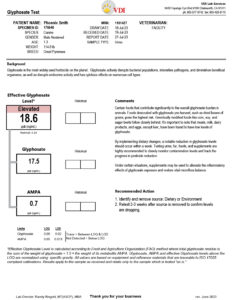
Glyphosate Testing
Glyphosate is the most widely used herbicide on the planet. With a staggering 736 million pounds being used annually globally, it’s crucial to understand its impact on our health and take proactive measures to mitigate its effects.
Glyphosate Testing – Overview
Canine , Feline – urine
Equine – hair
Studies have shown that 86% of people tested have detectable levels of glyphosate in their urine, with levels skyrocketing by 3800% over the past two decades. Disturbingly, animals bear an even heavier burden, with dogs found to have levels up to thirty times higher and cats up to sixteen times higher than humans.
| Included Tests: | Glyphosate AMPA |
| Species: | Canine, Feline, Equine |
| Sample Type: | Urine (Cats & Dogs) Hair (Horses) |
| Volume Needed: | 3-5mL Urine 100mg Hair |
| Fasting: | Not Required |

Which pets should test?
- ADR pets with undiagnosed GI signs
- Chronic GI distress
- Scratchy, Itchy, Red, or inflamed Skin
- Chronic Ear Infections/ Head shaking
- Excessive Licking
- Hair loss
- Chronic Cough / Sneezing
- Runny Eyes
- Diarrhea or Vomiting with unknown source
Learn more about Glyphosate
Overview
Glyphosate’s harmful effects extend beyond its prevalence; it actively disrupts bacterial populations, intensifies pathogens, and diminishes beneficial organisms. Moreover, its endocrine-disrupting activity and cytotoxic nature harm multiple cell types. Research links glyphosate exposure to a myriad of health concerns, such as fatty liver syndrome, infertility, and an increased risk of certain cancers, including non-Hodgkin’s lymphoma, leukemias, hemangiosarcoma, non-alcoholic fatty liver disease, microbiome dysbiosis, metabolic syndrome, and obesity.
Glyphosate is primarily excreted through urine and feces, which means that by reducing or eliminating dietary exposure, these levels can rapidly decline within days. Urine glyphosate levels reflect short-term exposure(days-week) while hair and fur samples offer a longer-term(week-hair) perspective. Good news is – by combining routinely testing with strategic diet and lifestyle changes, we offer a holistic approach that guarantees a of glyphosate levels to near zero.
Biological Effects of Glyphosate
- Contributes to metabolic syndromes and obesity.
- Bactericidal and seems to kill good microbiome leaving bad microbiome causing microbiome
dysbiosis. - Cytotoxic and genotoxic effects, meaning damage to cells and DNA.
- Increased oxidative stress, which can lead to inflammation, tissue damage and mutations to the
DNA. - Disruption of the estrogen pathway, which can affect hormone balance and reproductive health.
- Impairment of important cerebral functions, including memory and learning.
- Correlation with some cancers, such as lymphoma and leukemia.
- Damage to certain organs in animals like liver, kidney, pancreas, etc.
Recommendations
In general, reducing dietary exposure to glyphosate is the cornerstone of our approach. We’ve identified certain foods that contribute significantly to the overall glyphosate burden in animals. Foods desiccated with glyphosate pre-harvest, such as dried beans of grains, pose the highest risk. Genetically modified foods like corn, soy, and sugar beets follow closely behind. It’s important to note that meats, milk, dairy products, and eggs, except liver, have been found to have low levels of glyphosate.
By implementing dietary changes, you’ll witness a notable reduction in urine glyphosate levels within a week. Regular testing will confirm this progress, but remember that treats containing glyphosate can influence these values. Testing urine, fur, foods, and supplements are highly recommended to closely monitor contamination levels and track your pet’s progress in pesticide reduction.
Depending on your pet’s unique circumstances, your veterinarian may suggest special needs supplements to alleviate the inflammatory effects of glyphosate exposure and restore vital microflora balance. Feel free to consult with your veterinarian to explore these options further.
Take proactive steps to avoid outdoor contact with glyphosate. Stay vigilant about spray notices in parks, pathways, and similar areas. Regular bathing with soap and water will aid in removing glyphosate residues and other environmental pesticides.
We would recommend that you discuss the details of our glyphosate remediation plan with your trusted veterinarian. Our team of dedicated professionals at HRI is also available to provide additional guidance tailored to your specific needs.

